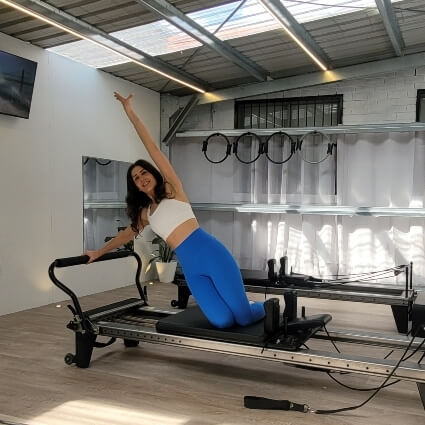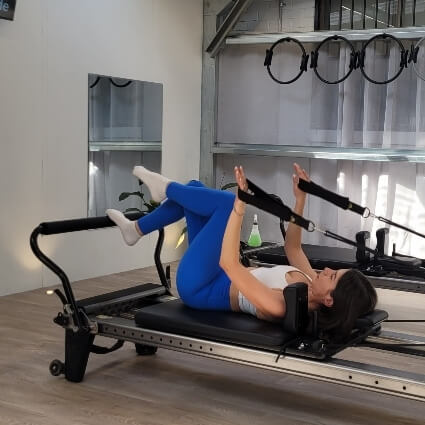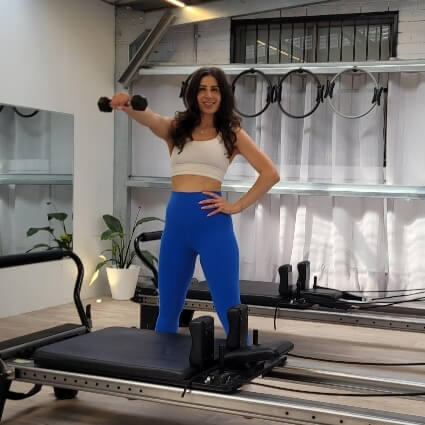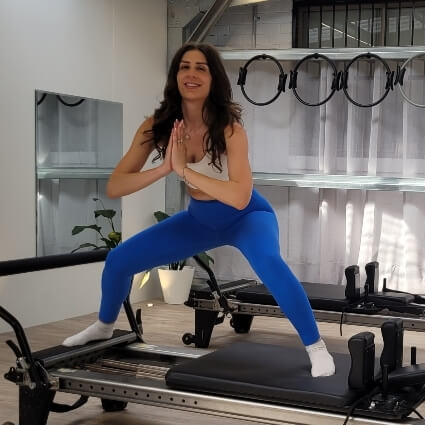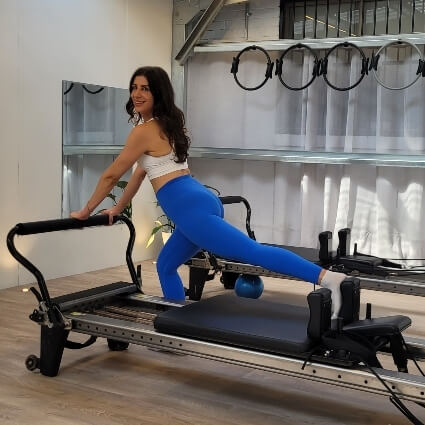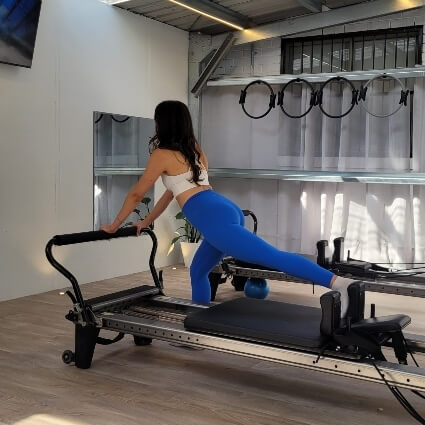Reformer Pilates at Inline Health Chiropractic
Private Reformer Pilates
One on one with a Reformer pilates instructor.
This apparatus consists of a flat platform (the carriage) that moves back and forth along tracks within a frame. The carriage is attached to springs, which provide varying levels of resistance.
Key Features of Reformer Pilates
Focus on Precision and Control
Benefits of Reformer Pilates
- Improved Posture: Strengthens postural muscles and enhances alignment.
- Core Strength: Activates deep abdominal and pelvic floor muscles.
- Increased Flexibility: Promotes greater range of motion in joints and muscles.
- Enhanced Athletic Performance: Builds functional strength and stability.
- Stress Relief: Incorporates breathwork that encourages relaxation and mindfulness.
Our reformer Pilates instructors have a certification to teach Pilates at a minimum.
![]()
Semi Private Reformer Pilates
Close checking by your pilates instructor but not entirely private. Groups are limited to 4 or 5 but only a Basic level of fitness and skill is required for this style of class. The instructor will guide you when you need it and Focus on making your technique better.
![]()
Reformer Fit Classes
Small classes and groups of 5. These classes designed to cater for people with better skill and knowledge of Reformer pilates. These classes will challenge you. Make you feel stronger, improve strength, endurance, fitness energy, balance and make you smile.
![]()
Clinical Pilates (Physiotherapy)
Your qualified physiotherapist will do a clinical assessment to make sure they design a program that is right for you. Each exercise is critequed and designed to make sure you are getting the absolute best results and Injuries are safely rehabilitated. Clinical pilates may require many different peices of equipment and your highly experienced instructor will assist you in maximising your improvement through better quality movement. Full private health rebates available for this service.
Key Features of Clinical Pilates
Common Conditions Addressed
- Postural issues
- Chronic back or neck pain
- Pre- and post-natal care
- Improved posture and alignment
- Sports injuries
- Arthritis or joint problems
Benefits
- Rehabilitation post-surgery (e.g., knee, hip, shoulder surgeries)
- Enhanced core strength and stability
- Better flexibility and range of motion
- Reduced pain and stiffness
- Increased overall physical function and well-being
How It Differs from Traditional Pilates
This type of Pilates is an excellent option for those recovering from injury or managing chronic conditions, as well as individuals looking to improve their movement efficiency and prevent injuries. All NDIS patients as well as WorkSafe, DVA, and TAC clients are eligible to attend our clinical Pilates classes conducted by a qualified physiotherapist. Prices for physiotherapy-led classes may be greater than listed for classes run by normal Pilates instructors.
![]()
Virtual (Instructor-Less) Pilates Memberships
Benefits
- Convenience: Practice anytime and anywhere with minimal equipment.
- Cost-Effective: Often cheaper than live classes or in-person sessions.
- Self-Paced Learning: Participants can pause, rewind, or repeat exercises to master techniques.
Who It’s For
- Those who already have a good understanding of Pilates basics.
- Individuals looking for affordable and flexible fitness options.
- People who prefer working out in private settings.
Intro Offer
Pilates Cancellation Policy
To ensure smooth operations and fairness for all clients, the following cancellation policy applies:
1. Class Cancellation
- Cancellations must be made at least 10 hours prior to the scheduled class time to avoid any charges.
- Cancellations made less than 10 hours before the class will be considered late, and the full session fee will apply.
2. No-Show Policy
- If you do not attend a class without prior notice, the session will be charged in full.
3. How to Cancel or Reschedule
- You can cancel or reschedule your class by contacting us via [Phone/Email/Booking Platform].
4. Special Circumstances
- We understand emergencies happen. If you are unable to attend due to unforeseen circumstances, please reach out to us, and we will do our best to accommodate you.
Thank you for respecting our cancellation policy and helping us provide the best experience for all participants.


